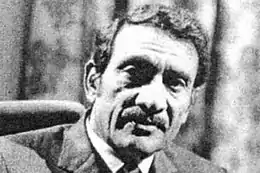A. Hameed
A. Hameed (born Shaikh Abdul Hameed; 1924 – 20 May 1991) was a Pakistani film score composer and music director.[1] He started his career in Bombay cinema (in modern-day Bollywood) and later worked in Lollywood. The first Pakistani film he worked as a director was Anjaam (1957), however he earned his recognition in film industry as a music composer.[2]
A. Hameed | |
|---|---|
 Shaikh Abdul Hameed a.k.a. A. Hameed | |
| Background information | |
| Birth name | Shaikh Abdul Hameed |
| Also known as | A. Hameed |
| Born | 1924 Amritsar, British India (present-day India) |
| Origin | Punjab |
| Died | 20 May 1991 (aged 66–67) Rawalpindi, Pakistan |
| Occupation(s) |
|
| Instruments | Piano |
| Years active | 1957–1991 |
| Associated acts | |
Biography
Shaikh Abdul Hameed was born in 1924 in Amritsar, British India (now India).[3][1] He initially worked in Hindi film industry with Ghulam Haider as a pianist, and subsequently composed music for Anjaam (1957) and Bharosa (1977) films.[4]
His family later migrated to Pakistan following the partition in 1947 and worked in Pakistani films as a composer.[3] His first hit film song that became very popular was in Raat Ke Rahi (1960 film). Then, in the same year, a widely popular film Saheli gained him a lot of recognition as a music composer. Another popular film Aulad (1962) followed.[4]
Filmography
| # | Title | Year | Credited as | Ref. |
|---|---|---|---|---|
| 1 | Anjaam | 1957 | Music composer | [4] |
| 2 | Saheli | 1960 | ||
| 3 | Aulad | 1962 | ||
| 4 | Susraal | 1962 | [5] | |
| 5 | Insaniyat | 1967 | Producer | [6] |
| 6 | Gharnata | 1971 | Music composer | [4] |
| 7 | Yeh Aman | 1971 | [7] | |
| 8 | Awaz | 1978 | [8] |
Popular film songs
| Year | Film | Song title | Sung by | Lyrics by | Notes |
|---|---|---|---|---|---|
| 1960 | Raat Ke Rahi[9] | Kiya Hua Dil Pe Sitam, Tum Na Samjho Ge Balam[9] | Zubaida Khanum | Fayyaz Hashmi | His first breakthrough hit film song |
| 1960 | Saheli | Mukhre Pe Sehra Daale, Aaja O' Aane Waale[10][9] | Nasim Begum and Nazir Begum | Fayyaz Hashmi | Producer/Director S. M. Yusuf A Silver jubilee film[10] |
| 1960 | Saheli[9] | Hum Bhool Gayey Har Baat, Magar Tera Pyar Nahin Bhoolay[9] | Nasim Begum | Fayyaz Hashmi | |
| 1960 | Saheli | Hum Ne Jo Phool Chunay, Dil Mein Chubhay Jaatein Hain[10][9] | Nasim Begum | Fayyaz Hashmi | |
| 1960 | Saheli | Kahin Do Dil Jo Mil Jaate, Bigirta Kya Zamane Ka[10] | Saleem Raza and Nasim Begum | Fayyaz Hashmi | |
| 1962 | Aulad[9] | Naam Le Le Ke Tera Hum Tau Jiye Jaaen Gae | Nasim Begum | Fayyaz Hashmi | |
| 1962 | Aulad | Tum Qaum Ki Maan Ho Socho Zara, Aurat Se Hamein Yeh Kehna Hai[9] | Nasim Begum | Fayyaz Hashmi | |
| 1964 | Tauba | Na Milta Gar Yeh Tauba Ka Sahara, Tau Hum Kahan Jaatey | Saleem Raza and Munir Hussain | Fayyaz Hashmi | Hamd Qawwali |
| 1965 | Shabnam | Chun Liya Mein Ne Tumhein Sara Jahan Rehne Diya | Noor Jehan | Fayyaz Hashmi | |
| 1971 | Angaare | Ab Ke Hum Bichhre Tau Shayad Kabhi Khwaboun Mein Milein | Mehdi Hassan | Ahmad Faraz | |
| 1971 | Yeh Aman | Zulm Rahe Aur Aman Bhi Ho, Kaise Mumkin Hai Tum Hi Kaho | Noor Jehan and Mehdi Hassan | Habib Jalib | A film about freedom struggle in Kashmir |
| 1974 | Samaaj | Chalo Kahin Dur Yeh Samaj Chhorr Dein | Mehdi Hassan and Mala | Habib Jalib | |
Awards and recognition
- Nigar Award for Best Music Director in Dosti (1971).[11]
Death
A. Hameed died in Rawalpindi, Pakistan on 20 May 1991.[2][1]
References
- "Renowned music composer A. Hameed is being remembered". Samaa TV News website. Retrieved 2 October 2020.
- "Death anniversary of A. Hameed observed". Newsone TV News website. 20 May 2015. Retrieved 2 October 2020.
- "Remembering musician A. Hameed on his death anniversary". Associated Press Of Pakistan. 20 May 2016. Retrieved 23 September 2020.
- "A tribute to A Hameed". The News International (newspaper). Retrieved 2 October 2020.
- "Tracing How Pakistani Film Music Has Declined Over the Decades". The Wire.
- "Lok Virsa to screen Pakistan hit film "Insaniyat"". Associated Press of Pakistan website. 17 October 2017. Retrieved 2 October 2020.
- "Seven unforgettable, daring Pakistani films". 10 December 2017.
- "AWAAZ - Film / Movie". www.citwf.com.
- "Profile of A. Hameed on Cineplot.com website". 1 January 2011. Retrieved 4 October 2020.
- Aijaz Gul (1 March 2016). "'Saheli' screened". The News International (newspaper). Retrieved 4 October 2020.
- A. Hameed's Nigar Award in 1971 on Cineplot.com website Published 13 May 2010, Retrieved 2 October 2020